

VOLCANO
Spend a night on the The cabins of Haleakalā


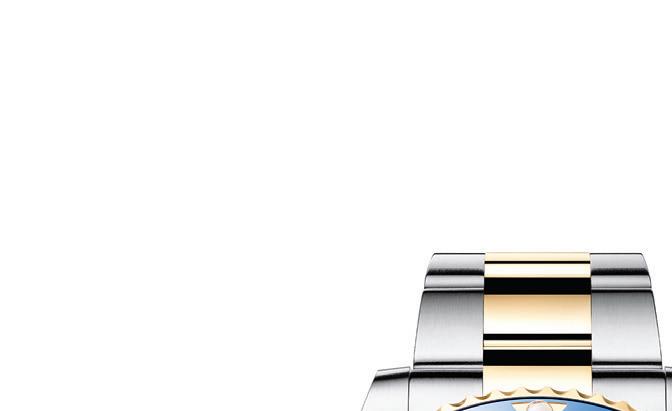





















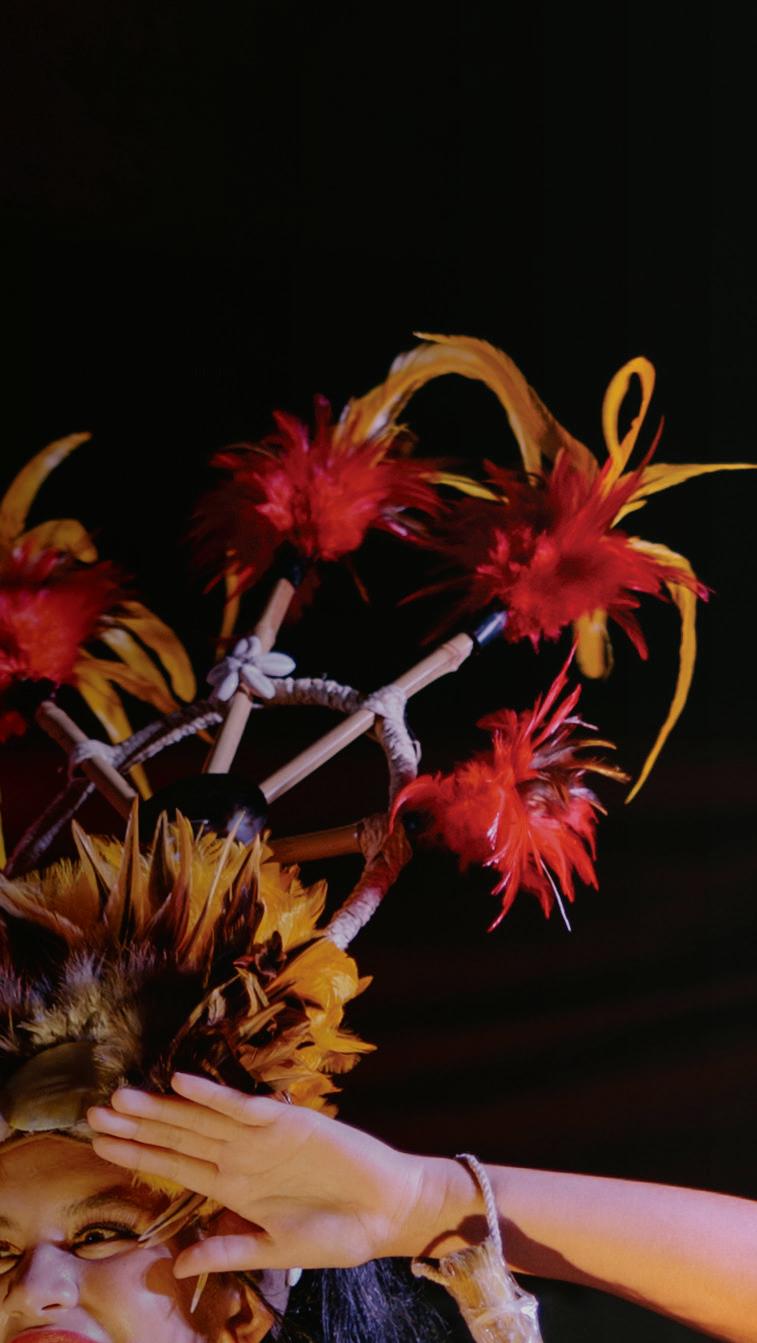










22
A WAY WITHOUT WORDS
The exquisite artistry of Robert Lyn Nelson speaks volumes.
30 A NIGHT IN A VOLCANO
Experiencing the rustic cabins of Haleakalā Crater is worth the effort.
38 TUGBOATS OF KAHULUI HARBOR
These stout vessels (and their crews) are the workhorses of the Valley Isle.

contents departments


46 ON THE COVER Maui's very own voyaging canoe, Mo‘okiha O Pi‘ilani, sails West Maui for unity with Lāhainā. Story begins on page 16.
Photo by Daniel Sullivan16
Talk Story
Tales of the island, fresh off the coconut wireless.
60 Craving Maui
Reimagined lounges, a bartop aquarium and champagne dreams captivate Maui diners.
56 Calendar of Events
It's springtime on Maui! Here’s what's happening.
60
Photo Contest
The arch angel of Honolua Bay.
62
In Their Own Words
By talking story and staying true to herself, Kalikolehua Storer infuses Hawaiian culture into resort hospitality.







SPRING 2024 VOL. 28, NO. 2
Maui Nō Ka ‘Oi is an internationally-distributed magazine dedicated to exploring the life and culture of Maui Nui. There’s a saying known in the islands: Maui nō ka ‘oi, Hawaiian for “Maui is the best.” We hope you think so, too.
Publisher & Executive Editor
Chris Amundson
Associate Publisher
Angela Amundson
CREATIVE DIRECTOR
Darren Smith
SENIOR DESIGNER
Jennifer Stevens
ED ITO RIAL
Editor Mona de Crinis
Dining Editor Carla Tracy
Executive Assistant Victoria Finlayson
ADVERTISING SALES
Maile Kekona, Marilyn Koponen
SUBSCRIBER SERVICES
Carol Butler, Janice Sudbeck
SUBSCRIBE
Call 1-844-808-6284, visit MauiMagazine.net or return a subscription card from this issue to subscribe: 1 year (6 issues) for $30 or 2 years (12 issues) for $52. Call or email subscriptions@mauimagazine.net for fundraising opportunities and bulk rates.
ADVERTISE
For rates and premier position availability, call (808) 242-8331 or email advertising@mauimagazine.net. Reservation deadlines are three months prior to publication dates.
CONTRIBUTE
Send queries, stories, photos and letters to the editor to editor@mauimagazine.net.
COPYRIGHT
All text, photography and artwork are copyright ©2024 by Flagship Publishing, Inc. For reprint permissions, email editor@mauimagazine.net.
Maui Nō Ka ‘Oi Magazine
220 Imi Kala St, Unit 204 PO Box 1450
Wailuku, HI 96793
(808) 242-8331
MauiMagazine.net

Maui Nō Ka 'Oi Magazine is printed on acid- and chlorine-free paper from Sappi, an environmental leader whose paper products comply with the Forest Stewardship Council and Sustainable Forestry Initiative.















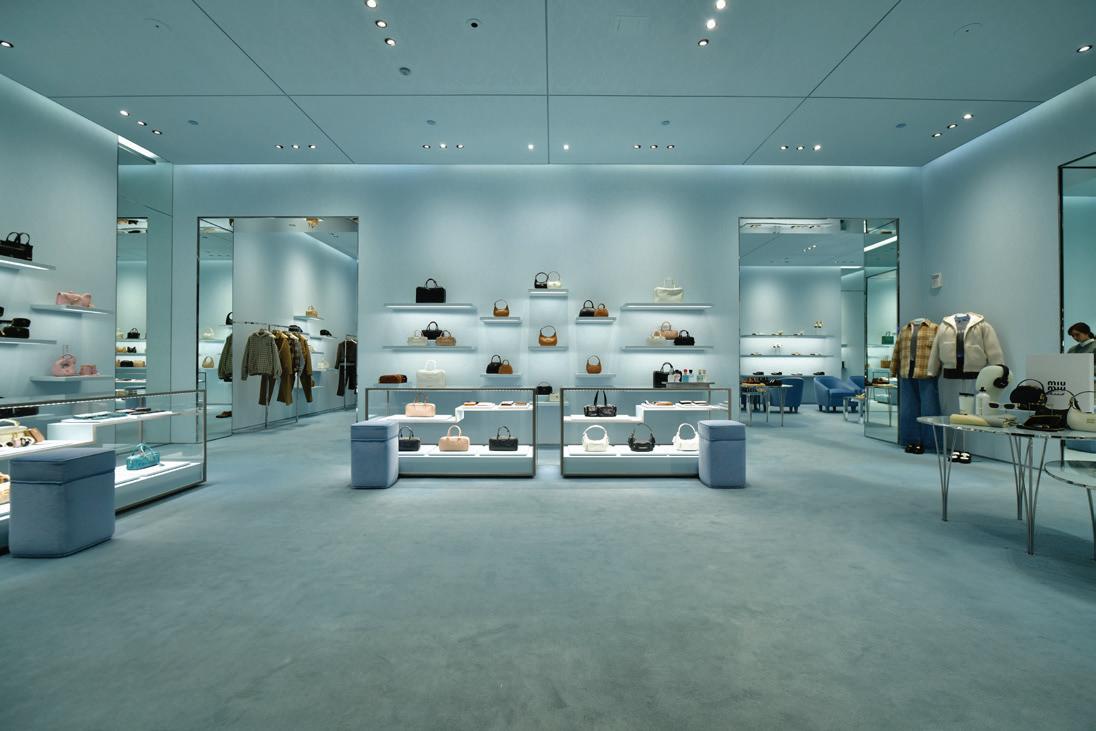


TALK
STORY
Fresh off the coconut wireless
story by Lisa L. Schell photographs by Daniel SullivanWa‘a Unity for Lāhainā
Four legendary voyaging canoes welcome thousands who walked for unity and healing
HOURS BEFORE the unity walkers began their procession to Launiupoko Beach Park just south of the Lāhainā burn zone, canoe clubs from across Maui prepped their outriggers under the pre-dawn stars at Hanaka‘ō‘ō Beach Park.
They would be escorting four of Hawai‘i’s voyaging canoes, led by Hōkūle‘a, to the walkers’ terminus at Launiupoko. The walk and afternoon activities would help unite Maui five months after the fires, through Lele Aloha’s Ho‘ūlu Lāhainā Unity Gathering.
Hōkūle‘a, a replica of the sailing canoes used by the early Polynesians, ignited
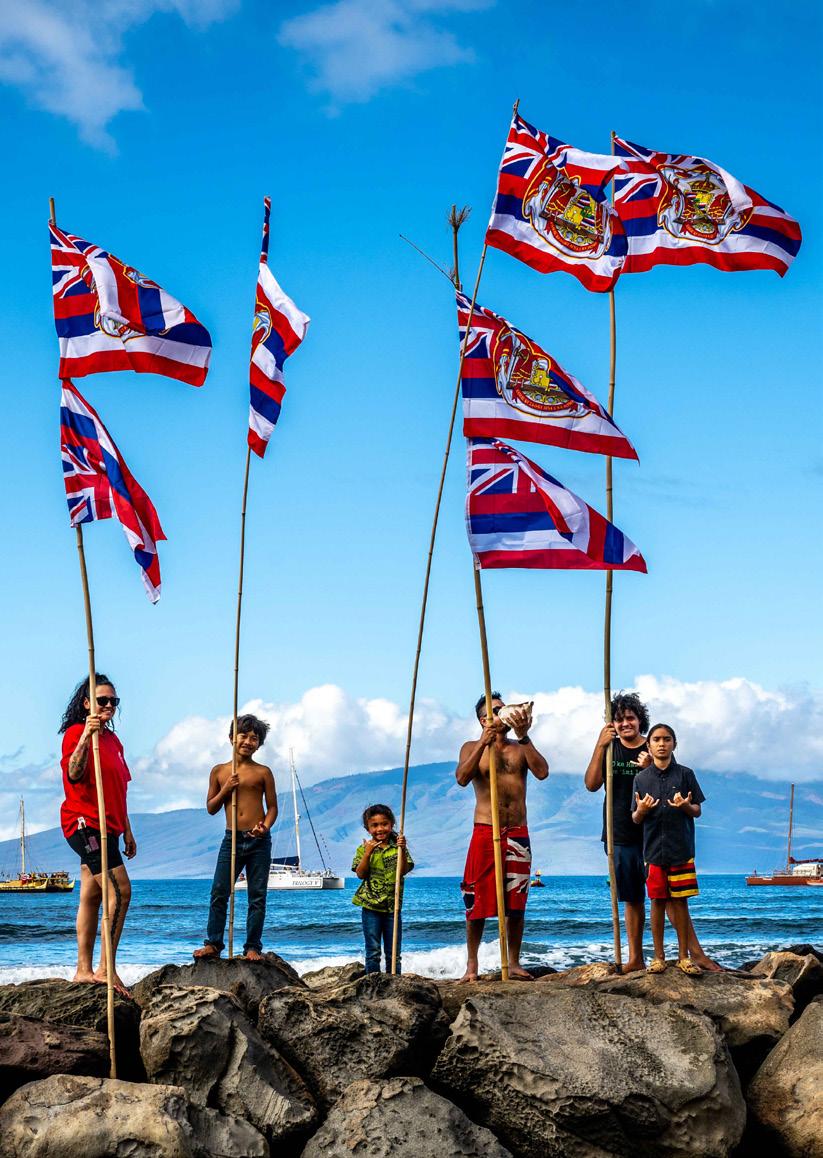
a Polynesian cultural renaissance with her maiden voyage to Tahiti in 1976. She and her sister canoes have since sailed the world, sharing Polynesian voyaging knowledge and spreading Hawaiian culture. The canoes represent the shared desire to protect and perpetuate Hawaiian values and places.
Hōkūle‘a’s first voyage to Tahiti launched from West Maui’s famed Honolua Bay, so when the fires devastated Lāhainā and parts of Kula on Aug. 8, 2023, leaders at the Polynesian Voyaging Society interrupted a 47-month, 43,000-nautical-mile circumnavigation of the Pacific Ocean to return home to support Maui.
The canoe paddlers stood on the beach, marveling at the sky’s clarity and the way Maui’s Fish Hook, Mānaiakalani, loomed large over the outline of Haleakalā. The brilliant Milky Way hung off the tip of the hook, just like a fish.
“Look! You can see all of Ka Iwikuamo‘o!” said ‘Anela Gutierrez, pointing at the North Star and then the Big Dipper as she traced an imaginary line down to the setting Southern Cross. Ka Iwikuamo‘o, also called the Backbone, is one of four star lines used by Hawaiian ocean navigators – including Hōkūle‘a crew – to find their way to and from Tahiti.
On the day of Hōkūle‘a’s return to Maui, it seemed fitting to all those who observed from the beach that these celestial bodies — so connected to the Hawaiian wayfinding tradition — would shine brightly in the early morning sky.
Soon, the stars gave way to first light, and the paddlers turned their gaze to the horizon just beyond Lāhainā Harbor. Jet

skis supporting the canoes zoomed back and forth from the beach, adding to the air of excitement and anticipation. Someone shouted, “There they are! The canoes!”
The masts and double hulls of the sailing canoes came into view. The six-crew outriggers launched from the beach and made a short paddle out to meet Hōkūle‘a, Hikianalia, Makali‘i and Mo‘okiha O Pi‘ilani, Maui’s own voyaging canoe that survived the fire.
The four sailing canoes and their outrigger escorts arrived offshore at Launiupoko as several thousand people walked 3 miles down the Lāhainā Bypass, through burn zones on Hokiokio Place and along the oceanfront of Honoapi‘ilani Highway to tents, food, music and festivities at the beach park.


Crew members aboard one of the sailing canoes chanted, asking the ancestors for guidance. Honu (sea turtles) poked their heads out of the water along the way. Just outside the circle of canoes, humpback whales breached, as if answering the call.
The six-man outriggers paddled around their larger counterparts, stopping now and then to marvel at their designs or to throw shakas to the crewmembers.
The ‘ohana of the wa‘a had come together for Lāhainā.
Maui’s Mo‘okiha O Pi‘ilani voyaging canoe moored at Launiupoko for the Ho‘ūlu Lāhainā Unity Gathering on Jan. 20, 2024. The sailing canoe crews were welcomed ashore with traditional cultural protocol, including the blowing of the pū.
Voices could be heard singing in the distance, above the sound of the ocean meeting the reef at Launiupoko. The walkers, wearing red for Lāhainā, became visible along the Honoapi‘ilani Highway.
Carrying state flags and banners, they made their way toward the beach, as the outrigger canoes lined up to land. Once on the beach, canoe crews united with the walkers, sharing tears, smiles, and hugs — many hugs.
He wa‘a he moku, he moku he wa‘a. The canoe is an island, the island is a canoe. A reminder to work together and mālama our island. On that day, we were all Lāhainā strong.
To watch the Lāhainā Unity Gathering, visit: tinyurl.com/Unity-Gathering

The little holistic farm that could
by Mona de CrinisAt Simple Roots, regenerative agriculture sprouts seed of hope earlier. At Simple Roots regenerative farm, nothing stays the same. And that’s just how partners Erin McFarland and Korey and Alissa Harris like it. In fact, moving everything around daily was their idea.
AS DUSK FALLS Upcountry, deepening the folds where Haleakalā reaches for the sea, paniolo (cowboys) and ranch hands from Olinda to Ulupalakua wrap up the day’s chores without a hitch. For some, the work is almost innate, written into their DNA or burned into neural pathways through time, tradition and rote.
On a scratch of pastureland straddling Makawao, a young farmer corrals his milk cow’s calf for the night. Grabbing hold of the collar, he slowly leads Peanut Butter toward the paddock. But as baby bulls do, Peanut Butter takes off on a full sprint with the farmer in tow, ducking electrical lines and dodging nomadic chicken shelters in a clip worthy of the Keystone Cops Don’t blame the farmer though — or the bull; that chicken-coop obstacle course set in a tangle of wires wasn’t there 24 hours

It’s a holistic approach to encouraging soil health known as rotational grazing, a key principle of regenerative agriculture. Using temporary fencing, or electric wire, and wheeled chicken shelters to reposition farm animals gives the land pause from pecking hens and grazing bovines and time to absorb the organic matter left behind.
It’s also how three impassioned providers are changing Maui’s farm-to-table landscape. Prioritizing fields over yields, Simple Roots works with nature to offer the only pasture-raised chicken currently available on island and other just-harvested delights — all from the seed of a simple home garden.
Alissa Harris repositions chicken coop with help from Erin McFarland. Korey and Alissa Harris (left) on property with son, Kelan, and daughter, Kennedy.
RYAN SIPHERS (ABOVE AND BELOW)While pregnant with their second child, Korey and Alissa Harris wanted to plant a few backyard veggies during maternity leave. Korey, an officer with the Maui Police Department, and Alissa, a board-certified behavior analyst working in child development, consulted Upcountry gardening guru Erin McFarland at a friend’s recommendation. She told them to add chickens, the “gateway to farming.”
They talked for a long time. Erin used words like “sustainable,” “permaculture” and “self-reliance,” which unearthed in Korey an untapped desire for Kennedy and her older brother, Kelan, to grow up understanding food origin and the value in caring for animals and the land.
“I want to make a go of this,” he told his wife one spring night over dinner in 2022, and a partnership was born. A few short months later, they entered a worktrade arrangement for six acres Upcountry, which had been run with horses and matted in thigh-high sour grass.
Toiling weekdays long after the whistle blew on their day jobs and weekends sunup to sundown, they cleared the land and gave it space to breathe. In less than a year, the trio had transformed the acreage into bucolic pastureland with quality grass free of pesticides or chemical fertilizers.
By July 2022, they had completed their first harvest, filled their first orders and grabbed the attention of elite Maui chefs. Pacific’o on the Beach, Papa‘aina and other popular restaurants began sourcing Simple Roots for local, sustainably farmed chicken. With business on an uptick, Korey took the plunge and resigned from the police department to focus fully on the farm.
Then Lāhainā burned, and with it, most of Simple Roots’ West Maui restaurant business. Saddled with harvests and few buyers, they donated the considerable surplus of those first months following to feed fire victims and partnered with Common Ground Collective, which sourced supplies for Chef Hui and westside food distribution hubs. Fortunately, Upcountry dining hotspot Marlow and about 500 loyal kama‘āina customers are keeping them afloat while the island heals.
With a Kiss-the-Ground sensibility rooted in compassionate land stewardship, Simple Roots appeals to enlightened foodies as well as the auntie on the prowl for local product. And for those suffering allergies, autoimmune diseases and dietary restrictions that prohibit eating commercially harvested chicken or meat refrigerated too long, it is a prayer answered.







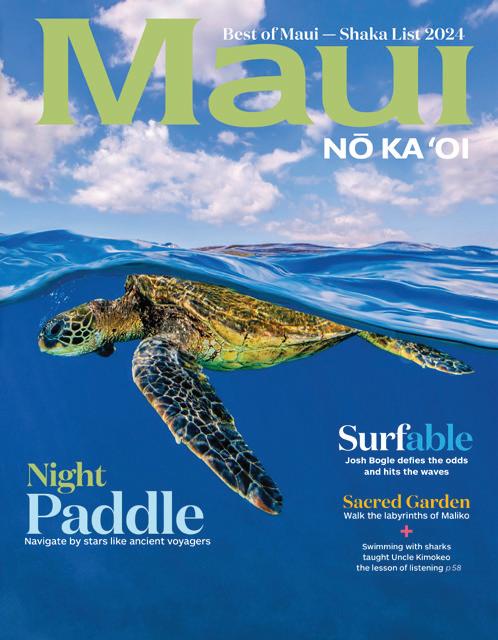





A Way Without Words
A love of Lāhainā and the ocean enliven renowned painter Robert Lyn Nelson
by Mona de Crinis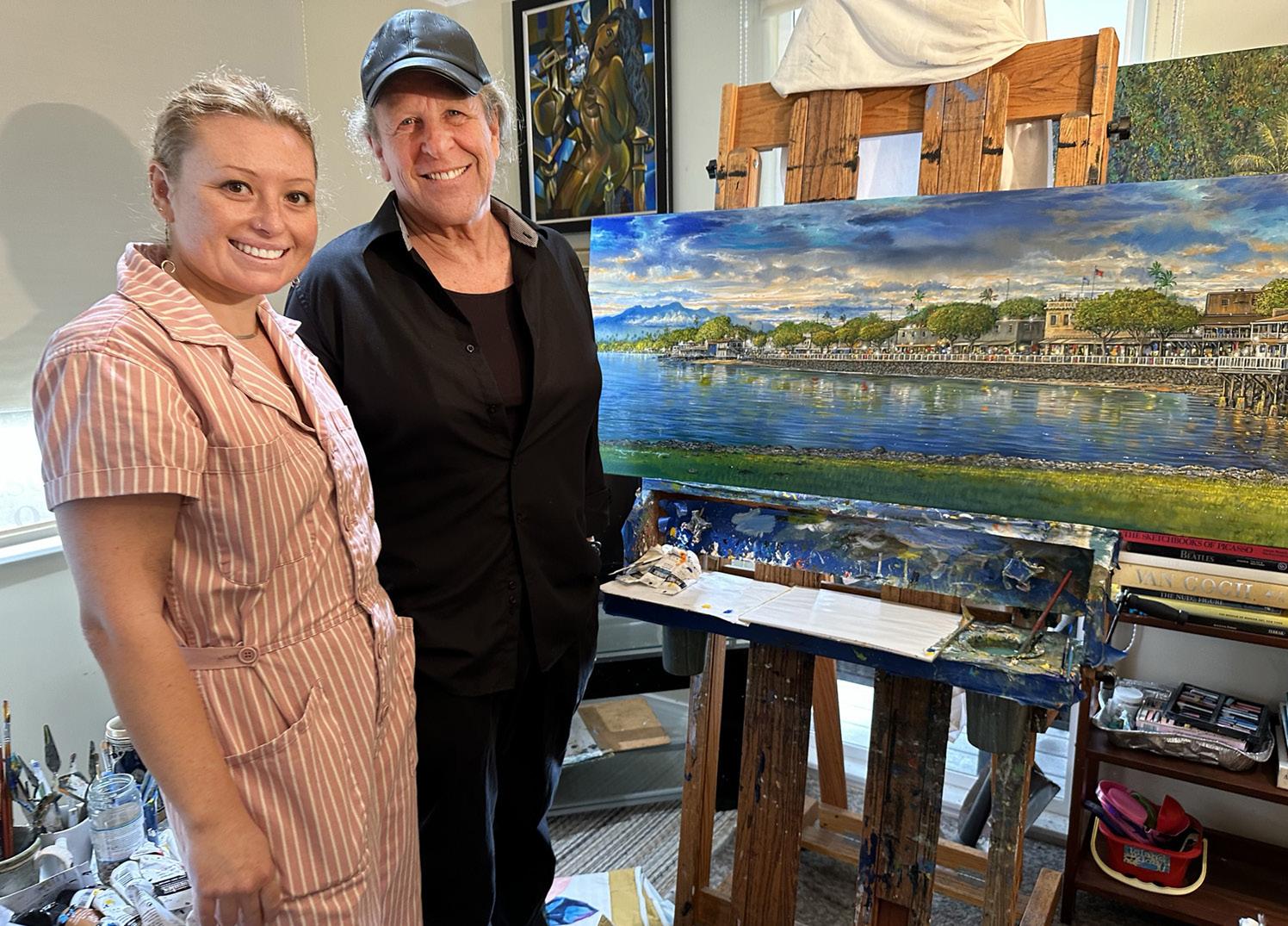
WWALKING INTO Robert Lyn Nelson’s home studio is an exercise in sensory management. Neurons fire and pulse quickens as eyes dart from painting to painting to painting, the brain fully engaged from cerebral cortex to medulla oblongata.
Hundreds of canvases representing almost as many mediums and styles easily eclipse the trappings of domesticity in this residence turned gallery. Abstracts lean against armoires, cubism punctuates corridors, impressionism floats atop high walls and surrealism seduces at every turn.
In what may seem a Maui brick-andmortar homage to the Old Masters and 20th century genre benders who helped shape Nelson’s craft, only the faint aura of their genius remains after the final brushstroke. Impossible to pigeonhole, his art defies both category and convention — products of a guiding philosophy that refuses classification and accepts no limits.
Paeans to other artforms — a sculpture here, a collage there, mixed media — are peppered throughout, as are exquisite explorations in oil that include whimsical
interpretations of everyday objects, a series of nudes in yellow and his sublime tribute to The Beatles featuring quintessential song elements surreptitiously woven into the iconic tapestry. A scattering of easels hold completed works or those in progress, patiently awaiting their metamorphosis from pupae to brilliant butterfly.
While grasping the magnitude of Nelson’s unbridled brilliance in a single glance is futile and proscriptive, it’s clear he dips often and deep into the creative well; his is a fount of fluid self-expression that cannot be capped.
His gaze resting on a recently finished piece, an asymmetrical explosion of angles and color, Nelson acknowledged the footprint of those who came before — David Hockney, Gerhard Richter, Pablo Picasso and other influential mavericks of contemporary art. But that’s where the similarities end. “I love Picasso,” he said. “But I don’t do cubism like he did. I do it my own way.”
And that’s how Nelson’s been doing it for more than 50 years. Hockney, Richter and Picasso may have set the signposts, but the path forged as one of Maui’s most prolific and
commercially successful talents is his alone.
In addition to a half century of showcasing his work in galleries in Lāhainā, most of which are now defunct or destroyed during last August’s wildfires, Nelson’s protracted curriculum vitae includes hundreds of worldwide exhibitions, collectors that include famous actors, four U.S. presidents and pedigreed rock stars Paul McCartney and Steven Tyler, youngest solo exhibitor (to date) at the Smithsonian Institute’s Museum of Natural History and founder of the Modern Marine Art Movement, or “Two World” style blending the seen with the unseen.
“The ocean art thing in the 80s and 90s? That was one big experiment,” Nelson said, recalling the vivid depictions of abovesurface and below-surface life — dolphins cavorting with humpbacks and honu (green sea turtles) under the sea while the harbor buzzes with activity above — that catapulted his career.
As an artistic prodigy growing up in California, Nelson was fascinated by stories he read about 19th-century whaling expeditions. The tales stoked his imagination and,






Nelson’s Beatles series celebrates the iconic group with song elements woven into the paintings.

John Lennon’s signature round glasses, a yellow submarine, an octopus and the record label’s trademark green apple appear in “Magical Mystery Tour” (above). His painted glass pieces include “Blackbird Vase” and “Strawberry Man Vase.”
“A fascination with the visual beauty of nature and the urge to draw it is my earliest memory.” – Robert Lyn Nelson

A longtime ocean protector and environmental activist, Nelson vividly expresses his fears and hopes for the planet through his art, including “Wisdom” (above), and climate change-centered works such as “On Thin Ice II” (top right).


at the age of 18, he came to the islands to find his muse in the historic whaling town of Lāhainā.
He found so much more. In Lāhainā, Nelson found a sweeping “culture of kindness” rooted in ‘ohana and carried by wind and sea. And when last August’s wildfires ripped through the heart of his adopted hometown, taking his along with it, he found solace in her memory.
Although the seven-day-a-week artist and self-admitted workaholic wakes each day not knowing what he’s going to paint, preferring to “be surprised, because you never know what life will bring,” there was no question in those following weeks and months.
Turning to canvas and palette, Nelson channeled his anger and grief into more than a dozen paintings honoring the spirit of the place that stole his soul more than half a century ago. “Beauty and Devastation,” a provocative piece juxtaposing a ravaged Lāhainā with the unsullied magnificence of Lāna‘i in the distance, went viral almost immediately.
The painting, while unsettling in its frank portrayal of tragedy, is a reminder of the promise that lives beyond the charred landscape, burned-out cars and blackened
coconuts. “I speak through my work,” said Nelson. “I wanted to convey that beauty surrounds us still. Lāhainā will rebuild, and we will hear her heartbeat again” — a powerful message of hope from an artist more comfortable with brushes than words.
Of late, Nelson’s focus has shifted to climate change. A staunch defender of marine wildlife, his dogged activism sparked decades ago after connecting eye to eye with a humpback whale while surfing Lāhainā waters. This once-in-a-lifetime encounter ultimately led to co-founding the National Marine Sanctuary Foundation with longtime friend, Jean-Michel Cousteau.
In a recent work, Nelson urges action and heralds the threat of inaction through strategically placed subliminal warnings — a tiny bee, a global obsession with pop culture, the crushing weight of the almighty dollar.
“I’ve spent 40 years trying to save the ocean through my work, and some people still only see Snoopy and Garfield,” he said with a wry smile. “But that’s the power of art, right? It resonates differently with different people, and they see what they need or want to see. Sometimes it’s better if you don’t explain it.”
If we’re lucky, one day he won’t have to.

Those who are up to the challenge are rewarded with a bewitching and sometimes other-worldly panorama forged from fire.
CHRIS ARCHER Story by Kyle Ellison Experience the rustic cabins of Haleakalā Crater
Experience the rustic cabins of Haleakalā Crater
STANDING ON the steps of Kapalaoa Cabin, it’s hard to describe the relief you feel when you hear the padlock click open. Out here, in the mountainous backcountry, miles from cell service or roads, backup options are few and far between if you don’t get the door to unlock.
Sleeping here, inside Haleakalā Crater, means you likely won’t see other humans for 14 more hours and the overnight temperature will hover near freezing. It’s just you and the stars, you and the silence, you and the thin mountain air. It’s isolation so immensely transcendental that Mark Twain, upon recounting his visit, admitted to his group that “there was little conversation, for the impressive scene overawed speech. I felt like the Last Man, neglected of the judgment, and pinnacled in mid-heaven, a forgotten relic of a vanished world.”
In other words, spend a night here inside Maui’s Haleakalā Crater, and you definitely feel like you’re out there
While most island visitors equate Haleakalā with sunrise or sunset viewing, few are aware of (and even fewer visit), the two campgrounds and three rustic cabins that dot the volcanic landscape.
Yes, you can sleep inside Haleakalā Crater, and if you’re lucky enough to snag a cabin (visit recreation.gov for reservations and wilderness permits), your reservation details include a code that not only opens the door to historic 12-bunk cabins, but also illumes a magical corner of the island unlike anywhere else on the planet.
That said, making the trek here — and camping overnight — isn’t easy. Spending a night in one of Haleakalā’s cabins means 7.4 miles of hiking (minimum) at altitudes ranging from 6,300 to nearly 10,000 feet. It means loading up your pack with sleeping bags, socks, snacks, lighters, headlamps and jackets stuffed in with packets of oatmeal, hot cocoa and freeze-dried food.
It’s the feeling of carrying it all on your back as you crunch across multi-hued cinder — the weight digging into your shoulders and resting on slightly-chafed hips. It’s the feeling of altitude reaching inside and
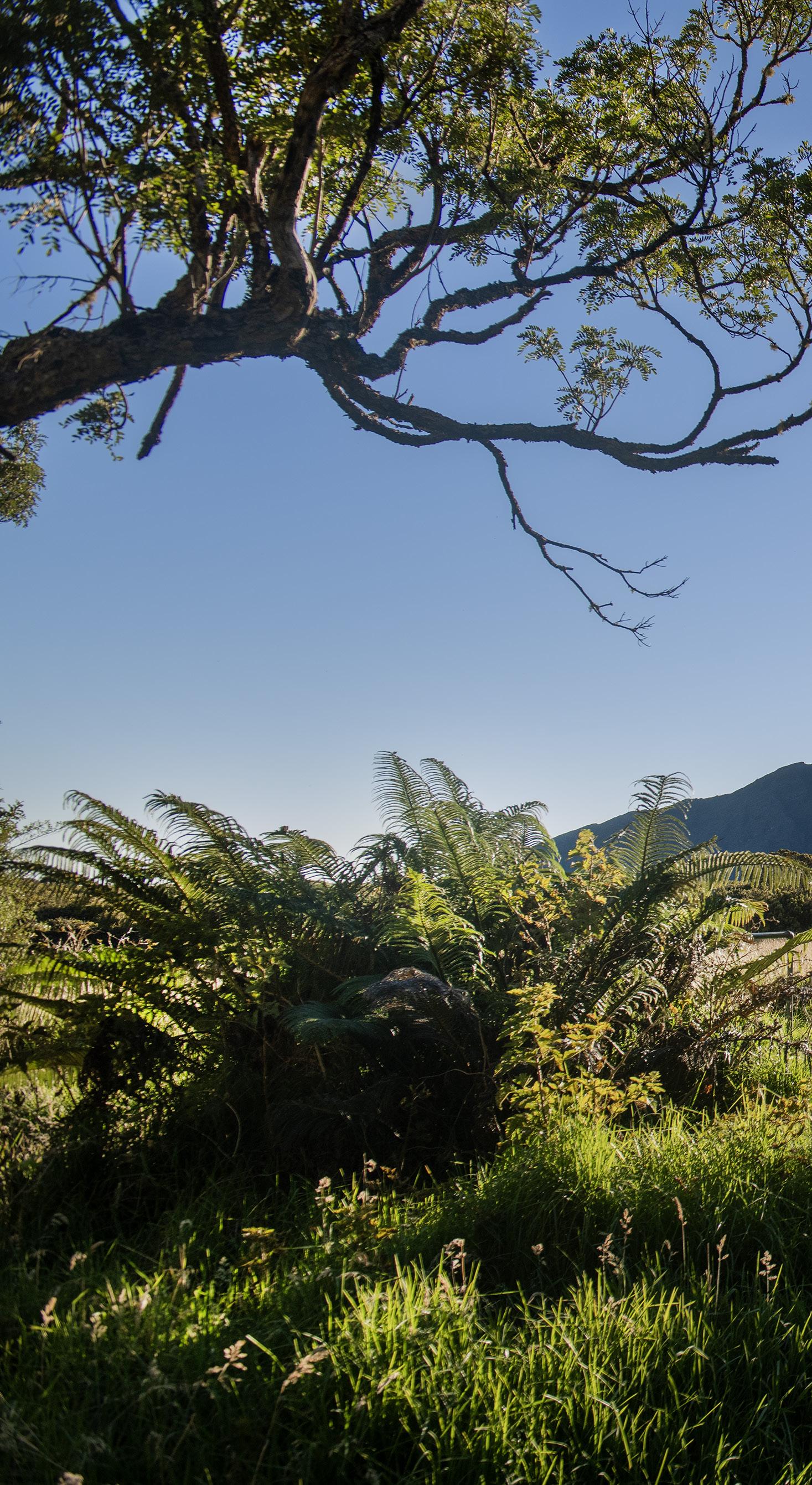

Whether sunrise or sunset, golden hour at Palikū Cabin is a magical experience reserved for those intrepid adventurers hearty enough for the journey and lucky enough to snag a reservation.



stealing air from your lungs, while simultaneously filling your soul with an empowering sense of freedom.
Once you do finally make it inside the cabin and kick off your cinder-filled boots, you can boil a pot of water using aging — but functional — pots and pans stocked in old wooden cupboards. Non-potable water is available for boiling, which comes out clear and cold from a tap that’s piped from an outdoor tank into the kitchen sink.
After making dinner on a gas-burning stove (remember to bring your own lighter), burn a few logs in the small wood-burning stove to heat up the room for the night. Beds are bunk style — three high — and you’ll want to pack a sleeping bag that’s rated for areas with frost. The amenities are basic, but it’s all that you
need; simplicity wins out over frills.
The three cabins inside Haleakalā Crater retain much of the simple, historic charm as they did when the Civilian Conservation Corps constructed them in 1937. There’s no TV, no room service, no lobby — just the view of grandiose, ochre-hued cinder cones right outside your front door. The long, old wooden picnic table that serves as the cabins’ centerpiece invites leisurely games of cards, conversation and laughter best shared with family and friends as you gather by lantern and flashlight.
The least strenuous of adventures to the three primitive cabins is Hōlua Cabin. At 6,940 feet, getting there requires 3.7 miles of hiking down Halemau‘u Trail. In clear weather, the steep, slick switch-backing trail offers stunning views of Ko‘olau Gap
stretching all the way to the ocean. On many days, however, afternoon fog shrouds the trail in a drizzly mist.
The cabin itself rests on a border of sorts, where vast windswept stretches of grass give way to rocky volcanic terrain and the lunar landscape beyond. It’s also the busiest, most well-trafficked cabin as the midway point for intrepid hikers making the 12-mile trek across the crater in a single day.
At the outdoor table that fronts the cabin, groups of picnickers rehydrate and refuel while resting their legs in preparation for the zigzagging climb up Halemau‘u, which will test the fittest of hikers. There’s also a wilderness tent site here, which can accommodate up to a maximum of eight tents, although campers must be self-contained and don’t have access to the cabin.

Well
... the impressive scene overawed speech.
I felt like the Last Man, neglected of the judgment, and pinnacled in mid-heaven, a forgotten relic of a vanished world.
– Mark Twain, recounting his visit to Haleakalā Crater

For an exclusive, private sleeping arrangement, Kapalaoa Cabin — at 7,250 feet tucks into a peaceful corner of the crater with no neighboring campground. Evenings here are crisp and clear, and the stargazing is spectacular. For a morning meditation unlike anything else on Maui, wake up at sunrise, open the Kapalaoa Cabin door to those first rays of light and embrace the frosty air.
As the sun illuminates the crater floor, the peak of Hanakauhi along the north rim stoically faces you at an angle only a handful of people may ever see. In a theater of calm where silence reigns, the depths of solitude are arguably greatest here at Kapalaoa, where stillness envelops the landscape. At 5.6 miles down Keonehe‘ehe‘e Trail (Sliding Sands), Kapalaoa requires the second most mileage of the three different backcountry spots.
Palikū Cabin, on other hand, is loud in the most beautiful of ways as rare birds whistle and chirp. More than nine miles from the nearest trailhead, it is the farthest, most difficult cabin to reach. Set at the base of a verdant cliff among rolling dew-covered pastures, Palikū is its own unique world.
At Palikū, where endangered forest birds cling to existence in this mistsoaked mountain utopia, humans are an afterthought and nature is master. A distant corner of Haleakalā National Park so far away and tough to reach, Palikū Cabin requires dedicated commitment and work to earn a spot in this exclusive mountaineering club.
And that’s the beauty of Palikū. It demands sweat, strained muscles, copious bottles of water and multiple breaks simply for the right to coexist in this space where time, cares, worries and troubles evaporate as quickly as the morning dew.
While camping at Haleakalā can be hard, it’s doable and worth the effort. Reservations are competitive and available six months in advance. With no distractions, to-do lists or screens, you’re reminded of just how many hours of sunlight there are in a single day. Just put one foot in front of the other, rest often, and the next thing you know, you’re unlocking the cabin door with a sense of untethered calm many of us have long forgotten.
 Story by Mona de Crinis
by Daniel Sullivan
Story by Mona de Crinis
by Daniel Sullivan
TOWING THE DISTANCE
Tiny and tough, tugboats are the shipping industry’s undisputed dynamos
Photographs
The navigational challenges of
make tugboats essential for the safe passage of barges and other large vessels.
Kahului Harbor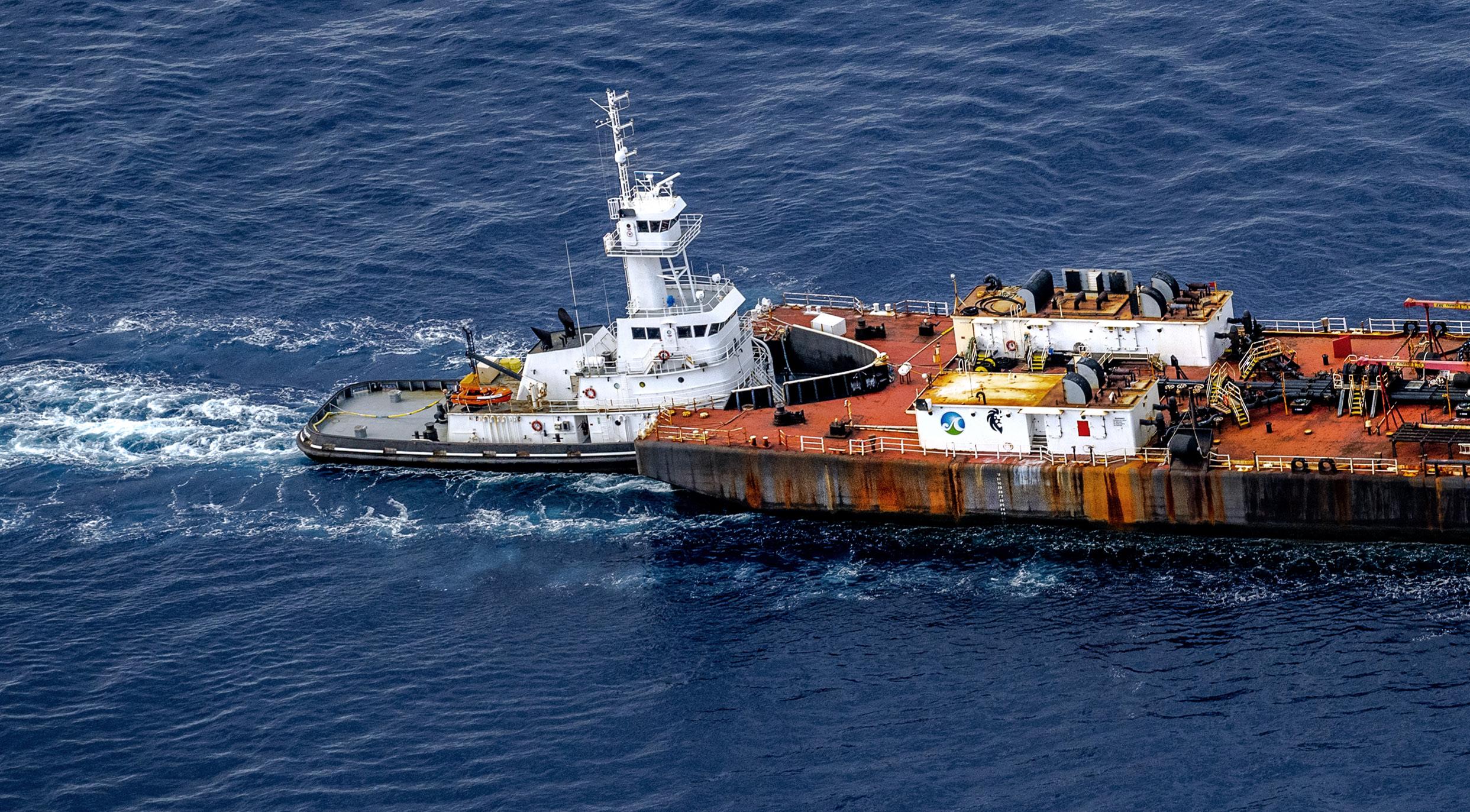
AMERE 200 FEET SEPARATES the tugboat from a lumbering barge laden with Maui-bound cargo. The unlikely duo — David with Goliath in tow — bob and weave as they battle a February swell rolling into Kahului Harbor.
Dredged up to 40 feet down into the naturally formed Kahului Bay, the manmade commercial harbor poses navigational challenges even when seas are calm. Ships with limited turn areas depend on tugs to arrive safely and dock efficiently.
Here, along the island’s exposed northern coast, waters rage at winter’s touch. Maritime operators must adjust accordingly or risk losing a vessel, load or both. Pulling incoming ships to shore is the tug’s towing wire — a massive cable two and a quarter inch thick — groans and rattles, straining against the pins that secure it to the towing bridle, the barge rising from behind like a tethered tsunami. Within a few miles of the harbor entrance, the tug captain slows to 6 knots, and the first mate shortens the towline to avoid snagging a wall of coral that flanks the eastern edge. In a salty dance that is both meticulously choreographed and wildly improvisational, the odd couple snake through the tight opening and shimmy to the pier with the help of a rear assist tug.
The barge coaxed into position, the first



“I’ve always wanted to be on the water, not in some nine-to-five office job.”
– Captain Chris Kojima, the Kāpena Bob Purdy
Chris Kojima (left) puts his innate understanding of Hawaiian waters to good use as a Young Brothers’ tugboat captain. A tug provides rear assist (above) to the Aloha Spirit barge. Assistant Engineer Jessica Yee helps maintain the hightech systems and intricate technology of Young Brothers’ impressive Kāpena class of tugboats.


mate releases the towing winch, the loading dock crew readies, and the towing tug preps for the next haul.
Much like the Hawaiian carpenter ant can wrangle a kukui nut 10 times its size, Young Brothers tugs strongarm a vessel three times as big. These 123-by-36.5-foot workhorses guide barges from the main supply hub in Honolulu to neighbor-island ports on Kaua‘i, Moloka‘i, Lāna‘i, Maui and both sides of the Big Island, while ensuring safe passage in and out of local harbors. They also provide escort services through congested or restricted areas, help larger vessels maintain course and speed, rescue disabled ships, and assist in berthing and unberthing of freight haulers.
In Kahului Harbor, Young Brothers tugs and barges facilitate the transport of goods to and from Maui, sailing alongside other mariners who frequent the harbor such as cargo and cruise ships, refrigerated barges, freight haulers and freight-hauling equipment.
The company prides itself on speed and keeps records to prove it. Back in 1931, Bob Purdy, namesake of the Young Brothers’ Kāpena Bob Purdy tug, towed two massive
steel barges capable of carrying 32,000 boxes of fresh pineapples from the San Francisco Bay Area to Honolulu in 10 days and 15 hours.
The tugs take in 40,000 gallons of diesel — enough to fill a two-car garage — at every fueling, with an overall capacity of 90,000.
“You know those big oil tankers you see on the road? That’s 10 of those tankers’ worth of gas under us,” calculated Chris Kojima, current captain of the Kāpena Bob Purdy , which calls Kahului its home port.
Kojima isn’t complaining. With increased speed and towing capacity, the Kāpena class shaves minutes off the roughly 30 hours it takes to tow a weighted cargo barge from Honolulu to Hilo — the longest regularly scheduled stretch.
Young Brothers’ $80 million investment in the state-of-the-art Kāpena reflects an ongoing commitment to safe, frequent, reliable and affordable transport service for the people of Maui and beyond, notes Megan Rycraft, director of marine operations. “Captained and crewed by our highly trained and experienced team members, these vessels help us move what matters
most efficiently and sustainably,” she said.
As a Young Brothers tug captain, Kojima has made the journey from O‘ahu to Maui countless times and confirmed without hesitation the navigational challenges of Kahului Harbor. Go too fast or too slow, and the barge could “surf” and overtake you.
Such dangers don’t faze Kojima.
“I’ve always wanted to be on the water, not in some nine-to-five office job,” Kojima said. “I can be a sailor and still be super dad at the soccer field while other parents are on their phones and laptops.”
When the seas are calm, the seven-person crew relaxes in the Kāpena tug. The tug is fitted with six rooms. Only the cook and able-bodied seaman — the lowest ranking crewmember — share a room. The other crew members have private berths. In these wellappointed floating domiciles, the only things missing are spouse and family.
All the comforts of home and none of the responsibility makes for a pretty sweet setup, joked Kāpena Bob Purdy First Mate Kalani Low. “If you don’t believe me, just ask my second ex-wife.”
 A Young Brothers tug is hard at work towing a supply barge destined for Maui lines up to enter the narrow channel of Kahului Harbor.
A Young Brothers tug is hard at work towing a supply barge destined for Maui lines up to enter the narrow channel of Kahului Harbor.

 By CARLA TRACY Dining Editor
By CARLA TRACY Dining Editor
Reimagined resort lounges, spritz-hour traditions and champagne with caviar captivate Maui diners
Additional reporting by Mona de
Crinis
COOL NEW LOOK … Named after Hawai‘i’s state fish, Humuhumunukunukuāpua‘a is a mouthful, and worth every bite. Always the classic Maui seafood restaurant with its Polynesian-hut design set on stilts in the middle of a salt-water lagoon, the reimagined flagship restaurant of Grand Wailea, A Waldorf Astoria Resort is even better than before.
Walk past waterfalls amid art installations and a sophisticated palette of bamboo,
wicker, and metal mesh enlivened with color. Set your drink on the Tihany Design circular aquarium bar teeming with little Nemos and other tropical fish. Then indulge in an impressive array of seafood towers, juicy prime steaks and oyster and caviar selections.
Tihany Design dreamed up Humu’s one-ofa-kind aquarium bar, where you can sit and experience an array of drinks, including The Grand --- the iconic signature Mai Tai expertly
crafted by longtime bartender Scott Dalton
“Humuhumunukunukuāpua‘a offers a truly one-of-a-kind guest experience featuring Maui’s only bartop aquarium. Enjoy innovative cocktails and meet the tropical fish who swim while you sip,” said Executive Chef Ryan Urig. “Some of my favorite creations include the spectacular seafood towers filled with the fresh sustainably sourced seafood such as Kona Prawns, Kusshi and Kumumoto Oysters, Dungeness
 The Grand Wailea’s upscale, seaside restaurant Humuhumunukunukuāpua‘a serves citrus-based cocktails with a wide variety of island flavors, and beers from local breweries.
The Grand Wailea’s upscale, seaside restaurant Humuhumunukunukuāpua‘a serves citrus-based cocktails with a wide variety of island flavors, and beers from local breweries.

Elegant dining at Ferraro’s Restaurant & Bar, the flagship restaurant of the Four Seasons Resort Maui at Wailea, includes king crab and burrata ravioli with butternut squash and sunset Italian spritzes for an evening overlooking the ‘Alalākeiki Channel.
Crab legs and Royal Petrossian Caviar, and our bone-in shutome accompanied by beluga lentils and shisocurry chermoula.”
With an eye towards culinary wellness, Executive Chef Ryan Urig enjoys partnering with Hawai‘i pelagic fisheries and local farmers as part of the 5-star resort’s ongoing sustainability program.
LA DOLCE VITA … On a previous visit, Ferraro’s was like a film set. A-list actor Adam Sandler dined at the table as kids shyly approached him for autographs. Whales jumped offshore, and outrigger canoes paddled toward Molokini.
Although there were no celebs around this last time, it was “la dolce vita” — the sweet life — anyway. Viewing ocean action from Ferraro’s perch atop Wailea Beach was epic as usual. Taking it over the top was the glass of Italian red paired with a simple margherita pizza and fresh kampachi Amalfi crudo with lemon salsa, watermelon radish, Calabrian chili cucumber and Acqua Pazza.
Just like Grand Wailea, Four Seasons Resort Maui also reimagined its flagship oceanfront restaurant. Cushy sofa groupings greet guests at the piazza entrance. Walk under a teak trellis to the new marble-topped bar complemented with custom bar back display

and tiled bar face. Italy meets Maui, for sure.
“Our intent with the new design and layout was to open up the space, connecting it both to its beautiful surroundings as well as to the hotel itself,” said Adam Goldstein, partner and design director of Studio Collective responsible for the redo. “Our vision for Ferraro’s evolution embraces the soul of the island, integrating contemporary sophistication with a welcoming, residential charm.”
Four Seasons Executive Chef Ryan Schelling and Ferraro’s Chef de Cuisine Russell Rummer wow with tableside caviar service boasting whipped mascarpone, egg yolk, chive, fried caper and pasta fritti; king crab and burrata ravioli with butternut squash; and Pesce Intero Alla Piastra of roasted whole fish with olivata, herbs and grilled lemon. All pastas are house-made.
A meticulously curated wine list features the most extensive selection of Italian wines on island. Sample varietals from more than 30 Italian wine-growing regions and 10 coastal Mediterranean regions or relax with a generous assortment of after-dinner amaros (Italian liqueurs), presented and served tableside.
Combining the best of Maui and Italy, the reimagined Ferarro’s promises a joyous culinary experience for both returning
guests and a new generation of diners assured Four Seasons Resort Maui General Manager Ben Shank
A CUT ABOVE … The latest offering from culinary trailblazer and multiple awardwinner Chef Peter Merriman, Ulu Kitchen by Merriman at the Westin Maui Resort and Spa recently opened its oceanfront dining experience in Kā‘anapali.
Keeping with Chef Merriman’s overarching farm-to-table credo, Ulu Kitchen sources fish, beef and coffee locally and Maui-grown fruits and vegetables as available. Among these is ‘ulu itself, also known as breadfruit. This “canoe crop” was brought by those who first came to Hawai‘i in their wa‘a, and has deep historic and cultural roots.
Want a taste? Try the prime filet mignon with sautéed mushrooms, ‘ulu mash potatoes, herb butter, arugula and rosemary french fries or taste the wild with Maui Nui Venison served with saffron rice, golden raisins, green beans, roasted poblano and guajillo adobo sauce. For gifts from the sea, you can’t go wrong with Ulu Kitchen’s macadamia nut catch of the day or lobster ravioli with lemon brown butter, spinach, basil-marinated laulea farm grape tomatoes and cornbread croutons.





Hawaii Magazine’s Third Annual Reader’s Choice Awards: Named One of the Top Five ”Best Hotel/Resort Restaurants” and “Best for Breakfast” in the state of Hawaii
Rated “Excellent” by Zagat
Maui No Ka Oi Magazine’s Annual Maui Restaurant ‘Aipono Culinary Awards: Best Ocean Front Dining: Gold

SAY HI TO PIE (AGAIN!) … Leoda’s Kitchen and Pie Shop, West Maui’s popular sweet shop and “glorified grandma comfort food” hub favored by residents and visitors alike, is back open daily from 10 a.m. to 6 p.m. Having recovered from the wildfires that tore through Lāhainā last August, Leoda’s once again offers scrumptious baked goods, including famous pies like Olowalu Lime, Chocolate Mac Nut and Coconut Cream, and delicious takes on classic dishes and sandwiches found only at its plantation-era eatery in Olowalu. Working directly with island providers, Leoda’s delivers customers the freshest, most sustainably sourced product possible.
Also reopening this year, Old Lāhainā Lū‘au invited the public’s return to its ocean-view venue on Lāhainā’s Front Street to experience an authentic lū‘au showcasing traditional Hawaiian music, dance, food and cultural presentations. Owned by parent company, Hoaloha Nā ‘Ehā, Ltd. which also operates Leoda’s, Old Lāhainā Lū‘au currently
Old Lāhainā Lū’au on Lāhainā’s Front Street has reopened after fire repair. At Leoda’s Kitchen and Pie Shop, Kylee Okazaki and Head Chef Eric Purugganan offer Olowalu Lime and Coconut Cream pies.
runs Tuesday through Saturday after months of repair from fire damage.
“After an inspiring Unity March on Jan. 20 and a private blessing of our employees and property the following month, we feel reopening Old Lāhainā Lū‘au is finally warranted,” stated the managing partners.
Aloha Mixed Plate, a third Hoaloha Nā ‘Ehā, Ltd. restaurant, reopened next to the lū‘au — serving plate lunches, salads and sandwiches daily from 11 a.m. to 7 p.m.
Another West Maui restaurant reopening
its doors of late is Māla Ocean Tavern — the first Lāhainā Front Street restaurant to do so post-fires. As all staff were and continue to be impacted, Māla Ocean Tavern is still accepting donations through its GoFundMe account. You can also support this plucky business while enjoying some of the best locally sourced seafood delights on island, such as Māla’s renowned Ahi Bruschetta featuring seared ahi served with flaxseed toast, edamame and local tomato drizzled with olive oil and balsamic.







GRAB-AND-GO GOURMET … Looking for something sexy to serve at a private beach picnic on or as an intimate feast in your hotel room? At Maui Prime Fine Foods in Lāhainā, gourmet food lovers may pick up a bottle of, say, Moët & Chandon brut and pair it with freshly shucked Kusshi oysters with mignonette.
“And we’ve got live Maine lobsters, very sweet, and Oscietra caviar, which is live Russian sturgeon stock,” said store owner and founder Cary Button. “It has a firm texture, unique glazed sheen, intense creamy taste and a lingering nutty flavor. Our new caviar purveyor is world-famous chef Thomas Keller and his company, Regiis Ova Caviar We get all the different grades.”
Champagne and caviar! Now we’re talking, any time of year. But if bubbly and sturgeon eggs aren’t your cup of tea, perhaps the Kobe beef from Snake River Farms , the A5 Japanese Wagyu and the prime Porterhouse steaks that are selling like hotcakes at Maui Prime Fine Foods.
“We have a lot of people under one roof with decades of culinary experience and can cater pretty much anything that you want,” continued Button, who also operates adjoining Oyster Seafood with his wife, Karin
Supplying top Maui restaurants and resorts for over 40 years, Oyster Seafood specializes in “the freshest, most glistening oysters that your money can buy,” Button said. Additional varieties include Fanny Bay, Belon, Pacific, Royal Miyagi, Shigoku, Kumamoto and Chelsea Gems.
A bountiful display case features seasonal and specialty cheeses, such as Fromager d’Affinoise double cream brie, truffle gouda cheese and St. Agur French blue, offered Maui Prime Fine Foods’/Oyster Seafood’s Will Hawkins, a certified chef as is Button. “We’re super excited to help with your dining plans,” he said, adding that Retail Manager Christine Gillis is “a veritable wealth of cheese information.”
GOOD VIBES GALORE
… Whether it’s the homemade slow-rise pizza dough fermented for 72 hours and baked in an authentic Italian oven, or the airy focaccia bread weighted in flavor only, Point Break Pizza & Panini at Maui Harbor Shops is Mā‘alaea’s laid-back go-to place for sandwiches, salads and, of course, pizzas.
Head Chef Sam Hatfield , who hails from Italy, boasts decades of dough making. Paired with General Manager/Owner Mark Lehman, former Hyatt Residences’ food and

Point Break Pizza & Panini proofs its dough for 72 hours and bakes its pies in an oven imported from Italy. Head chef Sam Hatfield immigrated from Italy. One of the pies is call Da Transplant, with kalua pork and grilled Maui Gold pineapple.
beverage director, it’s a culinary venture bolstered by a shared passion for food, connection and ‘ohana.
Go old-school with tried-and-true favorites like Margherita and Carbonara with bacon, white sauce and other traditional toppings, as well as distinctive offerings such as Da Transplant (red sauce with kalua pork, Canadian bacon, red onion and grilled pineapple), White Caps (white sauce, roasted garlic, portabella mushrooms, caramelized onions and arugula) and Freight Train Supreme (red sauce, pepperoni, fennel chicken, bacon, red onion, peppers, mushrooms and black olives).
Not in the mood for pizza? Indulge in a warm focaccia with honey butter, the Rochetta Salad with honey-lemon vinaigrette or one of several panini options — all of which come with or on Point Break’s signature house-made focaccia bread. Sub-gluten sensitive wraps are also available on panini.
OUR PAL JOEY ... You can now savor Chef Joey Macadangdang’s culinary innovations in Central Maui at his new Filipino-Spanish fusion restaurant, Balai Pata , in Kahului. Delight in traditional dishes with local flavor or come for some aloha during Filipino First Fridays








featuring a special street-food menu and fun activities like karaoke.
Popular Chef Joey dishes include Balai Pata Palabok, a seafood medley with rice noodles swimming in coconut-lime broth; Balai Pata Lumpia, an artful blending of carrots, garlic, ginger and cabbage in a mélange of soy, oyster and spiced vinegar sauces; Crispy Pata, braised pork knuckle deep-fried with soy chili and sawsawan; and assorted sabao-guisado, soups and stews such as Balai Pata Sigang (okra, long beans, choy sum, ginger, eggplant in a tamarind broth) and Kare Kare (oxtail stewed in peanut sauce with shrimp aramang bagagoong). You’ll also find more traditional offerings such as Chow Fun and Garlic Malungay Noodles.
SIP THE SEASON … Taking mixology to new heights, Tikehau Cocktail Lounge in Wailea opened to rave reviews with its tropical twist on classic cocktails such as an Old
Tikehau Cocktail Lounge serves tropical twists on classics, including Thousand Peaks (above left) and, Banana Stand. Balai Pata (right) serves lumpia, a blend of carrots, ginger and cabbage in a blend of sauces.
Fashioned spiked with Hashimoto Farmgrown persimmons or a Kula Country Farms strawberry ice cube afloat in a glass of Negroni. With a seasonal craft cocktail menu reflecting local spirit and ingredient availability, Tikehau Lounge captures the flavors of Polynesia in every sip.
Loosely translated as “peaceful landing,”
Tikehau embodies the aloha spirit that makes Maui a new favorite place to land with happy hour specials from 3 p.m. to 5 p.m. and mouthwatering “light bites” such as lomi lomi shooters, poisson cru, smoked taro hummus, kalua pork sliders with Fijian curry slaw, ahi and veggie poke, and other delicious offerings.











Kapalua Wine and Food Festival
June 6-9 • Kapalua Resort
Wine enthusiasts from around the world come to Maui each June to experience viniculture at the oldest food and drink festival in the United States, the Kapalua Wine and Food Festival. Participants attend tasting seminars, sample culinary delights from Maui’s top restaurants and mingle with master winemakers and sommeliers.
The festival supports local students through scholarships and underwriting for the University of Hawai‘i Maui College’s Culinary Arts Program. In a “Love for Lāhainā” theme, this year’s 43rd annual festival expands its charity toward grass roots initiatives that have helped in the aftermath of last August’s devastating fires. One of those is Chef Hui, a non-profit coalition of chefs and produce providers that distributed more than 325,000 meals across Maui.
This year marks the return of Celebrity Chef Cooking Luncheons. On June 7, Chef Charlie Palmer recreates his famed Pig & Pinot courses with a Hawaiian twist. On June 9, Chef Maneet Chauhan showcases cuisine from her restaurants in Nashville and Orlando, paired with wines from the Jean-Charles Boisset Collection.
The festival is stocked with a with a roster of wine-industry dignitaries, like master sommeliers Michael Jordan and Patrick Okubo. The festival’s keystone event is the Grand Tasting Gala, which features chefs from the Banyan Tree, Hua Momona Farms and The Plantation House. Guests enjoy walkabout tastings with an international selection of premium wines in the at The RitzCarlton Maui’s Aloha Garden Pavilion.
Other events include Interactive Wine Tasting Seminars held throughout the weekend. Guests learn the craft of farming the fruit behind the celebrated wines in the Napa Valley, taste internationally revered vintages and experience specialty pairings with Petrossian Caviar. Wine lovers can choose from a variety of ticket packages, including the four-day festival pass that provides access to all wine seminars, celebrity chef cooking demonstrations, VIP seating at the Grand Tasting Gala, an exclusive pre-event reception and a well-stocked gift bag.
For tickets and a complete schedule of events, visit kapaluawineandfoodfestival.com.
KAPALUA WINE AND FOOD FESTIVAL


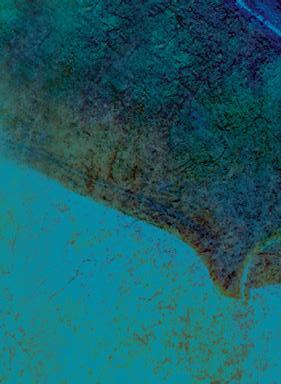












MAUI CLASSICAL MUSIC FESTIVAL

VIOLA AND MUSIC DIRECTOR

FRIDAY, MAY 17 • 7:00 pm Makawao Union Church
MONDAY, MAY 20 • 7:00 pm




Keawala‘i Congregational Church, Makena
WEDNESDAY, MAY 22 • 6:00 pm
Wananalua Congregational Church, Hana
FRIDAY, MAY 24 • 7:00 pm The Historic ‘Iao Theater, Wailuku
SUNDAY, MAY 26 • 4:00 pm The Historic ‘Iao Theater, Wailuku
FEATURING:
Formosa Quartet: Jasmine Lin, violin; Eric Gratz, violin; Matthew Cohen, viola; Deborah Pae, cello
Rohan De Silva, piano • Amir Eldan, cello

Yoonah Kim, clarinet • Sean Lee, violin
Zhenni Li, piano • Susie Park, violin






















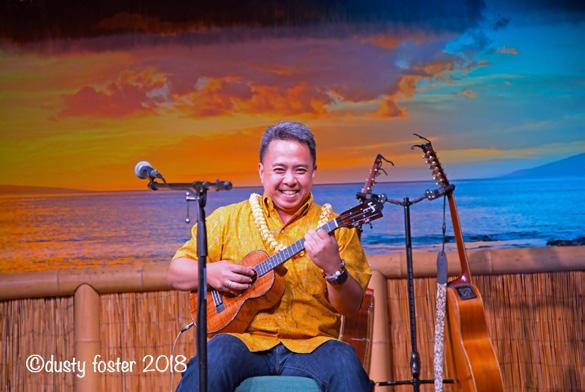
Wailea Village Farmers Market
Tuesdays • Wailea Village
Every Tuesday morning, eateries, vendors and crafters gather for the Wailea Village Farmers Market. Hunt for fresh, local produce or shop for one-of-a-kind Mauimade goods and souvenirs. This one-stop has everything da kine from botanical skincare to vegan sourdough to organic fresh pressed juices. 8-11 a.m. | waileavillagefarmersmarket.com.
Slack Key Show
Wednesdays • Nāpili Kai Beach Resort
Masters of Hawaiian music play every Wednesday for the George Kahumoku Jr. Slack Key Show hosted at the Nāpili Kai Beach Resort. Experience masters of different disciplines every week, each show its own unique performance featuring falsetto legends to mesmerizing ‘ukulele players. 6:30 p.m. | slackkeyshow.com
Maui Ag Fest
June 1 • War Memorial Stadium, Wailuku
Celebrate Maui’s rich agricultural industry at the 15th annual Maui Ag Fest. Ticketholders enjoy an expansive farmers market, 4H exhibits, keiki activities and live performances. Renowned Maui chefs create some of the most unique dishes that showcase a local ingredient of their choosing at event favorite, Grand Taste. This year, the festival adds Grand Dessert where chefs create a marveled dessert using Maui Gold Pineapples. 9 a.m.-4:30 p.m. | mauicountyfarmbureau.org.
White Hawaiian
June 2, 9; Oct. 6, 13, 20 • Pro Arts Playhouse, Kīhei
With three sellout runs and now the newly crowned winner of Best Cabaret/Concert/ Solo Performance from BroadwayWorld Hawaii, White Hawaiian returns to the Pro Arts Playhouse. Join Eric Gilliom in this one-man musical performance covering his Maui upbringing, growing up with Grammy-award winning sister Amy Hānaiali‘i Gilliom and his rise through the ranks of Broadway and television. Get your tickets early, it’s likely to sell out! 3 p.m. and 7 p.m. on Sundays | proartsmaui.org | (808) 463-6550
John Cruz at ProArts Playhouse
June 5, 20 • ProArts Playhouse, Kīhei
Join the multi-time Nā Hōkū Hanohano Award-winning artist and Maui music legend for special summer nights in June. This Maui music legend became a household name in the islands following the release of his 1996 hit, “Island Style.” Hear and feel every note of Cruz’s acoustic wonders and storytelling, always in his element at the Pro Arts Playhouse, Kīhei’s premier listening room. | 7 p.m. | proartsmaui.org
World Whale Film Festival
June 6 • Ocean Vodka Organic Farm and Distillery, Kula
During World Ocean month, the World Whale Film Festival showcases meaningful, conservation-based films that highlight the beautiful and vital relationship we share with our oceans. The festival kicks off with an in-person screening at Ocean Vodka Organic Farm & Distillery. Additional films stream only through July 31.
4:30 p.m.-9 p.m. | pacificwhale.org/filmfest
FOCUS at the MACC
June 15-Aug. 7 • Maui Arts & Cultural Center
A new exhibit named FOCUS is coming to the Maui Arts & Cultural Center this June, featuring seven contemporary Japanese photographers, collectively known as “photography?end?” As photography continues to rapidly evolve in today’s digital age, these artists focus on the materiality of photography, exploring their arts’ conception and theme. mauiarts.org | Schaefer International Gallery
Maoli at the MACC
June 22 • A&B Amphitheater Hawai‘i and Polynesia’s No. 1 independent commercial recording artist comes to the MACC for a one-night extraordinary performance. Maoli’s “country reggae” style brings listeners from around the island for an uplifting, feel-good experience. Bring your non-perishable goods for the Maui Food Bank to help those impacted by the wildfires. Donation bins will be located near the main entry gates. 6 p.m. | mauiarts.org
Makawao Parade and Country Concert
June 29 • Oskie Rice Event Center
Come to Makawao Town and join the 56th Annual Makawao Parade. Festivities start early this year with a keiki stick horse race at 8 a.m., followed by the parade at 9 a.m. as paniolos and pa‘u riders alike march through town. After the parade, enjoy performances from local talents Jordan Soon, Wai-Knot, Hālau Ke‘ala Kahinano O Puna and Te Ohi Nui at the Oskie Rice Event Center. | Concert at 1 p.m. | makawaoparade.com
Makawao Stampede 2024
July 5-7 • Oskie Rice Event Center
Since 1956, the Makawao Stampede (formerly known as the Makawao Rodeo) has celebrated paniolo culture as the biggest rodeo competition in the state. Kick off the festivities with the Makawao Stampede Concert and Bull Bash on Friday and enjoy bull riding, barrel racing, calf roping and more during the two-day rodeo. Don’t forget to sign up for Saturday’s Roselani Ice Cream eating contest, either! Visit Oskie Rice Event Center’s Facebook page for ticket information.
Upcountry Farmers Market
Saturday mornings • Kulamalu Town Center, Pukalani
Where can you find silver-casted orchids, freshly caught Maui fish, kimchi and local honey? Look no farther than the Upcountry Farmers Market, hosting over 40 local farmers (and counting) and other vendors with handmade goods every Saturday morning. This weekly hub is always buzzing with early-bird shoppers, so set your morning alarm – the good stuff goes fast. 55 Kiopaa St. | 7-11 a.m. | upcountryfarmersmarket.com
Wailuku First Friday
July 5-Dec. 6 • Wailuku’s Market St.
Get a taste of the local Maui Friday night life at this community streetfest held every first Friday starting in July. Celebrate the local community and visit small businesses, artists and crafters lined along the streets of Wailuku. Stroll down the historic Market Street, sample different eateries, shop for one-of-a-kind goods and listen to live music from local performers and artists. And the party doesn’t stop — all year long. 5- 9p.m. | 62 Market St. (808) 264-8779




Spirit of Honolua
Photograph by TRAVIS MORRINSONY A7R4, 1/800 SECOND, F7.1, ISO 250, 12MM LENS
TRAVIS MORRIN always had an artistic bent, the margins of his homework assignments perennially decorated with sketches and drawings. Although he ultimately pursued a different kind of art — culinary — partnering with best friends to open the wildly popular Three’s Bar & Grill and multiple Fork & Salad locations, Morrin scribbled-art beginnings surfaced during the pandemic shutdown.
Paper and pen alone could not capture the multihued, multilayered beauty of his island home, but a good photographer might. Morrin began taking his camera whenever he set out to hike, surf or explore, his deep reverence for nature and Hawaiian culture inspiring every click of the shutter. And he got better and better.
“I’d taken a lot of food shots over the years, so that part of my eye was already somewhat developed,” he said. “It was just a matter of learning the technical aspects and taking lots and lots (and lots) of photos.”
Since fully embracing this newfound passion in spring of 2021, Morrin estimates that he’s snapped around 150,000 photos. “When I dive into something, I dive very, very deep,” he said with a grin. “I shoot pretty much every day and everywhere I go.”
A frequent flyer over West Maui’s Honolua Bay, courtesy of a pilot friend with Go Fly Maui, Morrin vividly recalls that September morning in 2022 when he spied a rainbow taking shape from his perch in the open-door helicopter.
“We were passing through Nāpili when it began to form,” he said. “It was a really beautiful moment, framed by Kapalua and red cliffs, a couple of sailing catamarans in the water, so I took the shot — and got lucky.”
Get published! Submit your favorite and best Maui Nui UNDERWATER pics to photos@mauimagazine.net by July 1 for consideration in the Summer 2024 “A Hui Hou” photo contest.
IN THEIR OWN WORDS
Kalikolehua Storer
Hyatt Regency Maui Resort and Spa, Andaz Maui at Wailea Resort, H ā na-Maui Resort — Area Cultural and Training Advisor
“MY MOM IS a cultural advisor as well. And the one thing my mom always shared was, ‘You’re not one Hawaiian Barbie Doll. You be you.’
What she meant was, you don’t window dress. When you are Hawaiian, there’s no window. ‘Just hear my heart,’ that’s what I always tell people.
My passion was to teach. And I come from Lāhainā. I graduated from Lāhainā Luna High School, which just that school name alone tells you: You got some roots.

“Hawaiian
culture to me is this: You hānai them in good. You walk through the bad. Why? Because you love them.”
CHRIS AMUNDSON
After I graduated from high school, I went to University of Hawai‘i-Hilo, and that was going to be my mission: I’m gonna go be a Hawaiian language teacher.
Well, life happened. I met my husband in college. And we started a family. I had done summer work for Hyatt [Regency Resort and Spa], so I knew that I could live a comfortable life if I came into hospitality.
I was a front office agent. I was a reservation agent … guest services manager … and I said, ‘My, what else can I do?’
Then here comes my general manager, Mr. Jokovich, and he said, ‘Kalikolehua’ — he calls me by my given name — ‘I want to send you to hospitality training.’
When I met the facilitator, this guy looked like he was from the boondocks. But the way he spoke — it wasn’t so much what he said but how he said it — he was so genuine. I could visualize myself teaching like this: Talk story.
That’s how I learned from my grandma … from my mom. All of us kids, we would want to get around our elders, because they were funny. And they were telling stories about themselves. And today I remember all of those stories.
At the time, my hotel didn’t have a culture advisor. The general manager found value in … the person giving counsel and encouragement [to staff] from a Hawaiian perspective.
The characteristics and the way we moved in our family is the template I use today.
Real simple: You go to the kitchen, don’t make your grandma look for places in the dining room to sit. We should be anticipating those things. We serve our kūpuna. And so that’s what I teach here.
That part of our culture was missing from hospitality. What looked to be [Hawaiian] culture was the opening protocol — the oli (chant), the kīhei (ceremonial garment) and the bowl with the water and the ti leaf.
So, I had a conversation within myself to start teaching leaders how to talk story. My subject line when I have a meeting is ‘talk story.’ You know what that says? ‘Come sit — easy, easy — she just like talk!’
I tell leadership, ‘We can show you what aloha looks like, without one poster, without one banner, just by talking story.’
Sometimes I’ll bust out my kūpuna status from my years of service. I say, ‘You have the privilege to love people. When people come off the shores, our kūpuna teach us, you hānai them.’
A gentleman that lived next door [to Andaz Maui at Wailea Resort], he used to bring his dog down to the bar. He was no guest of a room. He was just an uncle that wanted to bring his dog, sit at the bar and talk story. And when he passed away all the employees say, ‘Kaliko, you can do his celebration [of life] on the ocean?’
‘Automatic.’ We never make them a big deal. But guess what? Everybody came? Why? Because everybody knew the uncle. He never make us rich. He wasn’t that kind guy.
Hawaiian culture to me, is this: You hānai them in good. You walk through the bad. Why? Because we love them. This kind of Hawaiian culture, it really gets you to the marrow of your bones. It starts to put things into perspective, and it keeps you real.
Today, I’m completely in a different attire than I was yesterday. But the heart is still the same. The help is still the same. All of them general managers have shared with me, ‘Thank you for keeping us on the ground. Thank you for always helping us to make sure we have an intent.’
I said, ‘Yeah, because you know, what they call outside of that? Barbie Doll.’ ”



